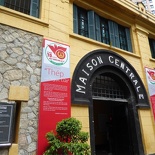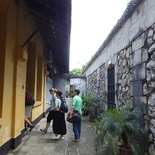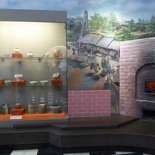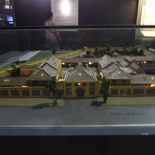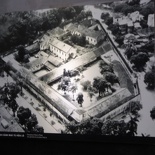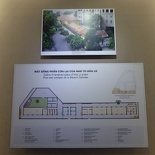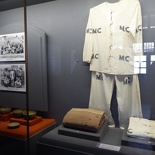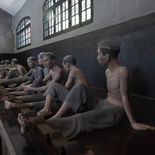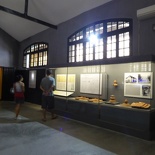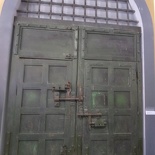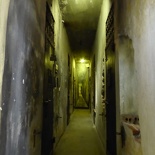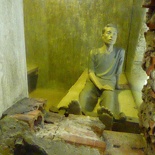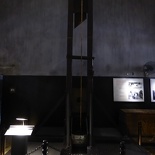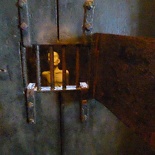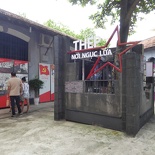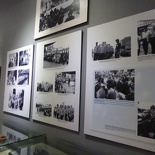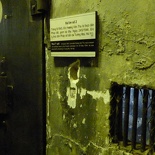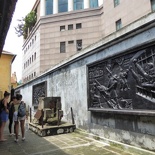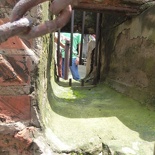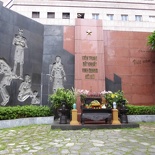Hanoi has a number of historical sites and markets worth visiting during your stay in the city. They range from dreamy large temples such as the Confucius Temple of Literature and gloomy sites such as the Maison Centrale Prison site. Let’s take a look at the Maison Centrale Prison today. It is one of the few more blizzare attractions in the city.
Maison Centrale was once and active prison located right in the heart of Hanoi city. Called Hoa Lo Prison by the locals, it was ironically nicknamed the “Hanoi Hilton” by US prisoners of war during the American War. Reason being the relative comforts the prison complex gave in relative to the perils of the Vietnam wars.
Hoa Lo Prison is a museum attraction worth visiting in Hanoi given its thought-provoking historical significance.
The attraction is open from 8am- 5pm daily costing 30,000 VND per adult. The vast colonial-style prison complex was built by the French in 1896. It comprises of several interlinked prison blocks with a large central courtyard. Comically, the front of the prison has the text “Maison Centrale” craved on a stone archway over the entrance, a contrast to the horrors which lies within. Moreover, the prison named after a stone fired stove, where “Hoa Lo” literally translates to stove/fiery furnace, with a more contextual meaning closer to “Hell’s Hole”.
Moving on, you enter the attraction main gate facing a mockup background painting of how large the prison courtyard used to be. Today only about and eighth of the once prison fortress still remains. The bulk of the prison grounds were torn down in the 1990s for development of an upscale 25-story Somerset Grand Hanoi serviced apartments and office complex. This lush complex sits adjacent to the museum grounds now. It is a stark contrast to the horrors which used to lay within the prison grounds.
Furthermore, the present museum attraction grounds is small and compact, guiding visitors on a tour through the old prison grounds and following a linear path through some of the cells and the old prison administrative buildings retained to today to tell the stories of the past. Also, most of the exhibits on display relates to the prison’s use up to the mid-1950s, focusing largely during the era of the Vietnamese struggle for independence from France.
Housing the revolutionaries and POWs
During its active days, the prison housed Vietnamese revolutionaries and American POW during the Vietnam War. Here, you get an overview of life and the hardship in the prisons. Inmates were forced to live in inhumane conditions, at times squeezing and sharing overcrowded beds, toilets and in small cells. Stories of overcrowding, malnutrition, solitary confinement and bad treatment were told through the exhibitions. This includes displays of personal items, journals and photographs.
These are artifacts are currently displayed in various air-conditioned exhibition areas which once served as the main prison cells. Behind the glass are pieces of prison records, diaries and personal belongings of inmates, as well as uniform and historical photographs painting the life in the prison. Additionally, one of the prison’s large steel doors preserved from the demolition are kept in this gallery too. Prisoners are often immobilized by applying shackles and wooden guards on the ankles on the beds to prevent them from escaping.
Dangers of Overcrowding
The prison was originally designed and intended to house around 450 inmates, with adequate space and sanitation catered. However, with the Vietnam war, this provisioning became pretty much an afterthought. Uncontrollably, the prison population exploding over four times the capacity with up to 2000 prisoners staying within the prison ground from records in 1930s.
Consequentially, this resulted in severe overcrowding resulting in sanitation and diseases in the prison going out of control. Left behind too after the French war are some gruesome relics, which you can view in the indoor exhibit area. Examples include an ominous French guillotine dominating one of the galleries. It was used then to behead Vietnamese revolutionaries right within the prison grounds.
Moving along from the dark prison cells bring you to the prison administrative buildings. Situated just by the attraction entrance, these buildings now houses photo galleries. On display are photos and belongings of several American pilots incarcerated here during the American War. Moreover, Hoa Lo prison too was dubbed “Little Vegas” by American pilots, and its individual buildings and areas were humorously named after Las Vegas Strip landmarks, such as “Golden Nugget”, “Thunderbird”, “Stardust”, “Riviera”, and the “Desert Inn”. Much to better the alleviate the already gloomy conditions of the prison during the American-Vietnam war.
Prison Escape stories
With overcrowding an issue, Hoa Lo Prison was also notorious as one of the less-secure prisons, with several escape stories of its own told through the exhibits.
Also told too were several stories of the hundreds who escaped from Hoa Lo Prison over the years, often from external help. Many obtained tools and assistance from outside to exploit weaknesses in the prison’s defenses. This includes secretly destroying and squeezing out through sawed-through sewer grates which separates the prison inner grounds from the freedom beyond.
Upon exiting the indoor exhibitions, you enter an outdoor courtyard area of the museum housing sections of dug up drain systems. Featured are the actual cut iron bars the prisoners broke through. These were preserved and displayed as whole. It shows the extent how these inmates managed to escaped and crawl through the tinniest of gaps possible.
Furthermore, this courtyard connects through the museum gift shop selling Vietnamese tourist souvenirs as well as several photo postcards featuring scenes in the prison. There is also an outdoor photo display area covering the crimes of war. Additionally, there is a connecting shrine and outdoor altar in what is left of the prison courtyard. This shrine serves as a memorial to those who perished in the war and also within the prison grounds. Undoubtedly a sad reminder of the consequences of war.
In all, you will be good for the Maison Centrale prison for about 2 hours. This will allow you to go through every single gallery and exhibit. This is good for an early morning of museums in Hanoi with an afternoon for further exploration in Hanoi.
View more photos of Maison Centrale Prison.

